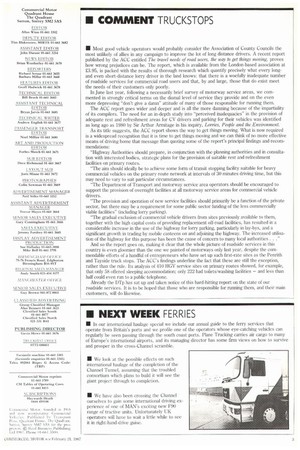• COMMENT TRUCKSTOPS
Page 5

If you've noticed an error in this article please click here to report it so we can fix it.
• Most good vehicle operators would probably consider the Association of County Councils the most unlikely of allies in any campaign to improve the lot of long distance drivers. A recent report published by the ACC entitled The travel needs of road users, the way to get things inoving, proves how wrong prejudices can be. The report, which is available from the London-based association at £3.95, is packed with the results of thorough research which quantify precisely what every longand even short-distance lorry driver in the land knows: that there is a woefully inadequate number of roadside services for commercial road users and that, by and large, those that do exist meet the needs of their customers only poorly.
In June last year, following a necessarily brief survey of motorway service areas, we commented in strongly critical terms on the dismal level of service they provide and on the even more depressing "don't give a damn" attitude of many of those responsible for running them.
The ACC report goes wider and deeper and is all the more damning because of the impartiality of its compilers. The need for an in-depth study into "perceived inadequacies" in the provision of adequate rest and refreshment areas for CV drivers and parking for their vehicles was identified as long ago as 1980 by Sir Arthur Armitage in his inquiry, Lorries, People and the Environment.
As its title suggests, the ACC report shows the way to get things moving. What is now required is a widespread recognition that it is time to get things moving and we can think of no more effective means of driving home that message than quoting some of the report's principal findings and recommendations: "Highway Authorities should prepare, in conjunction with the planning authorities and in consultation with interested bodies, strategic plans for the provision of suitable rest and refreshment facilities on primary routes.
"The aim should ideally be to achieve some form of transit stopping facility suitable for heavy commercial vehicles on the primary route network at intervals of 30 minutes driving time, but this may need to vary to suit particular circumstances.
"The Department of Transport and motorway service area operators should be encouraged to support the provision of overnight facilities at all motorway service areas for commercial vehicle drivers.
"The provision and operation of new service facilities should primarily be a function of the private sector, but there may be a requirement for some public sector funding of the less commercially viable facilities" (including lorry parking).
"The gradual exclusion of commercial vehicle drivers from sites previously available to them, together with the high capital costs of providing replacement off-road facilities, has resulted in a considerable increase in the use of the highway for lorry parking, particularly in lay-bys, and a significant growth in trading by mobile canteens on and adjoining the highway. The increased utilisation of the highway for this purpose has been the cause of concern to many local authorities. . ."
And so the report goes on, making it clear that the whole picture of roadside services in this country is even gloomier than the one we painted of motorways only last year, despite the commendable efforts of a handful of entrepreneurs who have set up such first-rate sites as the Penrith and Tayside truck stops. The ACC's findings underline the fact that these are still the exception, rather than the rule. Its analysis of 410 HGV service sites on primary routes showed, for example, that only 58 offered sleeping accommodation; only 222 had toilets/washing facilities — and less than half could even run to a public telephone.
Already the Dip has sat up and taken notice of this hard-hitting report on the state of our roadside services. It is to be hoped that those who are responsible for running them, and their main customers, will do likewise.












































































